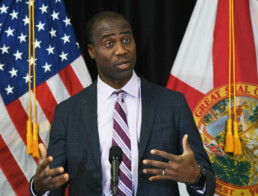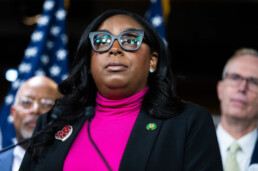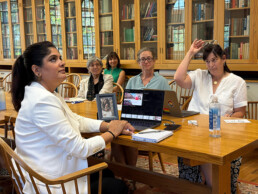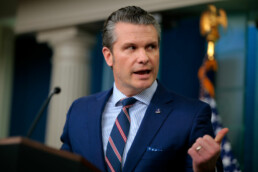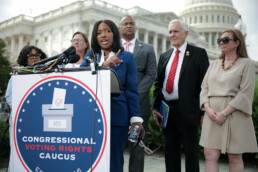"They're Sacrificing Our Children"
 September 4, 2025 Salutations, Meteor readers, There will be no news today, as I’ve instead chosen to use this time to send a second-by-second reaction essay to the trailer for Emerald Fennell’s Wuthering Heights. Kidding! In today’s totally normal newsletter, we learn about how we’re currently living in a Planet of the Apes prequel. Plus, author Scarlett Harris on the significance of Mariah Carey receiving the Video Vanguard Award (her first VMA) this weekend. Shannon Melero  WHAT'S GOING ON“There’s no precedent for this”: Yesterday, Florida’s surgeon general announced that the state plans to end all vaccine mandates for everyone, including schoolchildren. That means that the long-time, lifesaving vaccines for polio, measles, and many more (very! preventable!) diseases could become options rather than requirements. I had one obvious question: what the fuck? So I spoke to Dr. Dara Kass, an emergency room physician and healthcare policy consultant in New York. “To be clear, they’re not banning vaccines,” Dr. Kass clarifies. “They're saying your pediatrician may not stock it, your insurance may not cover it, [and] the other kids in school may not be vaccinated.” And without a requirement in place, insurance companies get the message that they don’t have to cover these treatments, making it more difficult for them to be readily available at doctors’ offices and pharmacies. Suddenly, the burden shifts to the consumer, and if there’s one thing American consumers know, it’s that our for-profit insurance companies will do what is in the interest of their bottom line, not public safety (because it’s literally not their job). In other words, Dr. Kass explains, elected officials are working to “make [vaccines] much harder for us to get, and they didn’t advertise that when they went into office.” It would appear that Florida is taking advantage of a chaotic moment in federal vaccine guidance, but Dr. Kass disagrees. “I think that this is a long-standing plan that [the Florida GOP] have to be inflammatory and extremist,” she argues. “The lack of leadership at HHS is empowering Florida to do things that are the most inflammatory and the most extreme. No rational person thinks that dismantling requirements for schoolchildren—which helps community safety—is a logical and smart idea.” Dr. Kass says that officials like Florida Surgeon General Joseph Ladapo are “sacrificing our children” to prove they’re in alignment with Robert F. Kennedy’s leadership and the MAHA agenda to “dismantle our public health infrastructure.” “This is clearly an attempt to do that,” she says. “There's no precedent for the idea of removing requirements for vaccines for anybody.” And it isn’t just a Florida problem. Imagine, if you will, unvaccinated children who unknowingly have a virus in their system running around sneezing on everything as children are wont to do—and coming into contact with the elderly, with the immunocompromised, with people suffering from long covid. Adults who fall into those categories, vaccinated or not, will be affected by these changes because, as Dr. Kass explains, “older Americans rely on herd immunity” for protection. You don’t have to work too hard to picture the worst-case scenario because there is an entire film genre dedicated to painting that picture. (See: the entire Planet of the Apes franchise, Contagion, I Am Legend, or any zombie movie ever.) It’s not all negative, though. States like Pennsylvania, California, Washington, and Oregon are reacting to the federal government abandoning the ship of public health by actually being helpful. Pennsylvania announced that its vaccine policies will be guided by (you’ll never believe it) the top medical societies in the state. Meanwhile, the three western states are combining forces to create the West Coast Health Alliance to “uphold scientific integrity in public health.” So, as we always like to say when things start to go completely off the rails: call your representatives, no matter their party. One thing we should all be able to agree on is that more people dying from preventable illnesses is bad, and the only way to move forward is with proven, effective science, which we have! Ask your representatives to commit to following the science and not the changing winds of political power. And if they’re reluctant to speak up, just remind them that every person who dies—and people will die if this becomes the norm—is one less vote for their re-election. That’ll get their attention. AND:
 BY SCARLET HARRIS Why Mariah's First Moonman Matters MARIAH AT THIS YEAR'S BET AWARDS (VIA GETTY IMAGES) This weekend at the MTV Video Music Awards, Mariah Carey is being awarded the Video Vanguard Award—her first VMA. If it feels long overdue, that’s because it is. While the Songwriters Hall of Fame inducted Mariah in 2020, her videos have, until now, gone unrecognized at the biggest industry awards show. That oversight is especially galling, given that Mariah—a powerhouse biracial woman with a vocal range that could shatter glass—has understood the power and impact that a video can have since the start of her career. Long before the idea of women musicians controlling their own image and voice went mainstream, Mariah directed several of her earliest and most influential videos, from the deceptively simple “Fantasy” (’95, with that iconic fairground clip to “Always Be My Baby” (’97) to the Life of a Showgirl-coded “Breakdown” (’97). “I’d done a lot of videos and wasn't always a hundred percent thrilled,” she said at the time. “So I figured I would give directing a shot.” It worked. The Mariah-directed videos reflect a gaze that actually centers her face—a novel idea at the time.  BACKSTAGE WITH LL COOL J AT THE 1997 MTV VIDEO MUSIC AWARDS (VIA GETTY IMAGES) With her remixes, which were often given more attention than the original tracks, Mariah became a reverse crossover star—from pop into R’n’B. No mean feat as Mariah was famously under the thumb of her controlling husband and manager, record executive Tommy Mottola, who was intent on continuing to market her as the girl next door instead of letting her explore her biracial identity and R’n’B roots. In 2022, when Pitchfork’s then-editor-in-chief Puja Patel named the “Fantasy” remix featuring Ol’ Dirty Bastard the best song of the 1990s, shåe lauded the track as “a declaration of independence, a reclamation of agency and identity, a blueprint for a new kind of pop song that would be replicated for decades to come.” (Certain men were very, very mad about that.) Mariah’s musical career had highs and lows after that: Glitter was panned; The Emancipation of Mimi was triumphant, and since then, Mariah has shot videos that are self-referential (“Touch My Body,” ’09), audacious (the Eminem diss track “Obsessed,” ’09), and more. But all the while, she has wielded absolute control over her image, including as the reigning, ageless Queen of Christmas. (It’s nearing that time…) Today, her influence is felt in the world-building that Beyoncé and Taylor Swift offer in their visuals. And like Beyoncé, who only picked up a Grammy for Album of the Year this year, Mariah is a woman of color who has been overlooked too long. She has five Grammys in genre categories, but she’s never won the big one, calling the awards show “overrated.” It speaks to the outsized impact women of color, and particularly Black women, have on culture—while simultaneously being snubbed by the establishment. Now Mariah is finally being awarded her due. Rock & Roll Hall of Fame, your move.  Scarlett Harris is a culture critic, author of A Diva Was a Female Version of a Wrestler: An Abbreviated Herstory of World Wrestling Entertainment, and editor of The Women Of Jenji Kohan.  FOLLOW THE METEOR Thank you for reading The Meteor! Got this from a friend?
|
![]()
When Schools Are Scary
 September 2, 2025 Fair Monduesday, Meteor readers, Ya girl is back and revitalized! Not from being in nature, which was a delight, but from playing the Beautiful Chaos EP in an endless loop over the speakers in my house when no one was around. And yes, be assured, I was doing the choreography (incorrectly).  In today’s newsletter, I’m channeling the anxiety over back-to-school season and suggesting what we can do to help each other out. Plus, the yarn breaking the camel’s back and a basketball/Black Panther crossover. Gnarly, Shannon Melero  WHAT'S GOING ONBack to scared: This morning, everything from my family group text to my Instagram feed was swimming with photos of kids heading back to school. Even my two-year-old, who recently got moved up to the big kids’ group at her daycare, got in on the fun, holding her moving-up certificate with a big, toothy grin. But for many of us, the day now has a darkly predictable anxiety to it as well. After all, parents, teachers, and students have, in the last five years alone, survived more than 1,000 gun violence events in K-12 schools in America. As if it isn’t bad enough to wonder will there be a gun in my child’s school today?, parents and teachers are facing additional threats: cuts to the education department, the elimination of DEI programs, Title IX challenges, the specter of AI in the classroom, and the incursion of ICE agents, who have detained families traveling to and from school. All that doesn’t even touch on the basic fears we’ve now normalized, like bullying or sexual harassment. Not to age myself here, but back in my day 👵🏼, active shooter drills were not a monthly occurrence. Now, as a parent, I receive emails about them regularly from my toddler’s daycare center. I will never forgive this country for being so nonchalant about gun violence that caregivers must now learn to protect literal infants from an active shooter. So aside from deep breaths to help us quell our fears, what can we do? Support a teacher: Most of us know at least one teacher, so make a difference by simply asking them what they need. Help with supplies? A shoulder to cry on? Cash for therapy? If you’re feeling super generous, check out Funds for Teachers. Be loud about gun safety: Every. Single. Day. Talk about the anti-violence measures we need so much that your friends get tired of hearing from you. Then make new friends and repeat. Report icy conditions: There are a number of ways to quickly let people know if ICE is lurking by a school. There’s an app to report any sightings while you’re out and about, and remember that it is still illegal for ICE agents to enter a school without a warrant, so if you are a school employee, know that you are not obligated to open the door until a warrant is provided. Be honest with your kids: We can’t anticipate every danger our children will face, but we can be open about what they can expect. Have a conversation with your kids about their rights and equip them with the knowledge to stand up for themselves and each other, even if adults in power won’t. Join the PTA: This will be my least popular bit of advice, but if Moms for Liberty can sway elections, then the least the rest of us can do is weigh in on what’s happening in the school library. What’s at the top of your mind for this back-to-school season? Drop us an email at [email protected], and we might answer it in our next newsletter! AND:
 ACTIVISTS DEPARTING A PORT IN BARCELONA MONDAY EVENING, FOR MANY IT IS THEIR SECOND TRIP (VIA GETTY IMAGES)
 FOLLOW THE METEOR Thank you for reading The Meteor! Got this from a friend?
|
![]()
It's a Love Story
 August 26, 2025 Good evening to Swifties and the people who love them, Today marks 0 days since Taylor Swift announced her engagement and 105 years since the ratification of the 19th Amendment, which secured the vote for (some) women in the United States. Huge day. To sort out our feelings about that (the unfinished work of suffrage, not Taylor, for whom we’re uncomplicatedly happy), we called up Rep. LaMonica McIver. The congresswoman has been in the news since May, when she was charged with assault after attempting to conduct an entirely legal congressional oversight visit at an immigration facility in Newark, New Jersey. She has pleaded not guilty. In today’s newsletter, Rep. McIver shares her own personal call for action. Plus, something good is happening in Illinois. Fearlessly, Cindi, Mattie, and the team  WHAT'S GOING ONVoting like our lives depend on it: Over a century ago, the 19th Amendment became law and millions of women in the United States were granted access to the ballot box. Sounds great, and it was. But not for everyone. It’s never simple to mark these kinds of dates on the calendar, and the 19th Amendment—a rad thing, to be clear—did not in fact do what it promised for large chunks of the population. Poll taxes kept some poor women from voting. It wasn’t until the Voting Rights Act of 1965 that Black women in the Jim Crow South (and some Native American women, for that matter) were able to cast their ballots. Voting can feel like the bare minimum, but August 26 is a reminder that people fought hard for even this basic right. We vote so we can exercise one of our most essential liberties, but we also vote so that we can elect qualified, inspiring candidates, who can represent our interests. When democracies are working as they are supposed to, this is in fact a wildly beautiful and cool process.  REP. LAMONICA MCIVER, AT A NEWS CONFERENCE IN FEBRUARY 2025. VIA GETTYIMAGESIn honor of Women’s Equality Day, we called Rep. LaMonica McIver—one such legislator. Below, the 39-year-old U.S. congresswoman from New Jersey shares her thoughts on suffrage, activism, and where we go from here. When I think about suffrage, I think about how women are leading the fight for representation across this country. Women have always been leaders on voting rights, immigration, and justice, and they’ve shown how these issues are tied together. Now more than ever, women are doing that work. Our freedom is under attack each and every second of the day under this administration, and that makes this anniversary so much more important. It’s a day that reminds us why we have to keep leading. We have an administration that is trying to take us backward, rolling back civil rights, women’s rights, and the protections our ancestors fought for. We’re seeing them do it with the stroke of a Sharpie pen. I know people feel defeated, but I want people to focus on what they can do. As a member of Congress, I’m always asking myself, “Why am I doing this?” The “why” for me is the people I represent, who are counting on me to raise their stories and to advocate for them, to make sacrifices for them, to give a voice to the people who are voiceless. They give me strength. We all have a “why,” and we all need to find it to keep pushing for the country that we know. We can’t always predict where our fight will take us. I tell people all the time: I did not come into office with a robust immigration plan. That is the honest truth. But I knew I wanted to protect the people in this district—documented, undocumented, women, children. And that is exactly what I am doing. I am showing up to do the job I was hired to do. There’s something for everyone to do. Voting is something. Exercising the right that suffrage gave us is something. Keeping your circle informed is something. The work that folks in the media are doing is something, because you are being attacked as well. You don’t have to be the next Martin Luther King, Jr., but you have to find something to do. You have to stay engaged. — Rep. LaMonica McIver (D-N.J.), as told to The Meteor A few “somethings” you can do on this anniversary:
AND:
 FOLLOW THE METEOR Thank you for reading The Meteor! Got this from a friend?
|
![]()
Can Mifepristone Help Prevent Breast Cancer?
 August 19, 2025 Top of the evening, Meteor readers, Anyone else lose half their day binging the first set of Love is Blind UK episodes? No? Just us? Oh, well! In today’s newsletter, we take a look at a new way scientific research is being hindered by political ideology. Plus, a sleepover for one at the Texas House. Love innit, The Meteor Team  WHAT'S GOING ONSlowing down science: Earlier this month, when Health and Human Services Secretary Robert F. Kennedy Jr. announced the cancellation of some mRNA vaccine research, we wrote about the devastating toll that move could have on breast cancer research specifically. But it turns out that’s not the only hit breast cancer research is taking. Last week, a group of reproductive health experts published an opinion piece in the medical journal The Lancet, drawing attention to the potential that the drug mifepristone—best known as an “abortion pill”— could also be used as a tool to prevent breast cancer in high-risk patients. There’s just a bit of a roadbump: Because of the extensive “regulatory, political, and legal barriers” around the drug, the experts fear that researchers and pharmaceutical companies are failing to invest in exploring mifepristone’s possible benefits. As one of the piece’s authors, Kristina Gemzell Danielsson, writes, “We have very promising data, but no efforts are being made to continue with the research…the regulatory hurdles are absurd, probably because [mifepristone] is associated with induced abortion.” The writers of The Lancet come from all over the world, but their concerns have particular resonance in the United States, where more than half of the states have some sort of restriction on mifepristone, and on a federal level, RFK Jr. has asked the FDA to review mifepristone again, claiming safety concerns. To be clear: the drug is well-researched and has also been deemed safe and effective in nearly 100 countries. The development of new treatment options for BRCA1- and BRCA2-positive patients is urgent. People with those gene mutations have a significantly elevated lifetime risk of developing certain cancers, including breast cancer, and for now, the most common treatments recommended to them are prophylactic double mastectomies and hysterectomies. These surgeries are invasive and emotionally taxing, plus, they don’t fully guarantee remaining cancer-free. According to The Lancet, some preliminary studies have shown that mifepristone could curb progesterone, the hormone that drives the kind of uncontrolled cell growth that is a hallmark of cancer. While there still have not been clinical trials to prove the efficacy of mifepristone as a form of preventative treatment, the possibility that a pill could replace a massive, life-altering surgery is worth every penny of investment. So what can be done? The researchers behind The Lancet editorial are asking political leaders to remove the barriers and collaborate on accelerated research to study utilizing mifepristone—a drug that, again, we already know is incredibly safe. “Ideology can slow everything down,” Danielsson writes. We’d hope that even the GOP could admit that making progress on breast cancer research is an area for common ground. The Meteor reached out to the Department of Health and Human Services to ask whether it supports new research into potential uses for mifepristone and, if so, how it plans to make the drug available to researchers when over a dozen states have banned its use. Representatives from the department have not responded to our request for comment. AND:
SCREENSHOT VIA INSTAGRAM
 FOLLOW THE METEOR Thank you for reading The Meteor! Got this from a friend?
|
![]()
Four years of the Taliban
 August 14, 2025 Hi Meteor readers, Popping in for the second time this week with a recommendation so fervent, I had to commandeer the newsletter to make it. Last night, I finally saw the Tony-nominated play John Proctor Is the Villain, and I’m still levitating. I cackled with laughter. I cried! The show is set in a high school in rural Georgia, and it unfurls as a class of students reads Arthur Miller’s The Crucible while the #MeToo movement swirls. There are meditations on trust and friendship, jokes about Glee, an epic interpretive dance, feminism club, and such biting, clever dialogue that of course Tina Fey has signed on to produce the movie adaptation. It’s pitch-perfect and brilliant, and here I was thinking 2018 was not a period of time I wanted to revisit at all. If you are anywhere near New York, you must, must, must see it before it closes on September 7. That concludes The Meteor’s Theater Corner. Meanwhile, a special edition of the newsletter below: Today we have a beautiful and moving reflection from Lima Halima-Khalil, Ph.D., who writes to us on the eve of the fourth anniversary of the U.S. withdrawal from Afghanistan, recalling the tumult and horror of that day and sharing her own perspective as a millennial, mom, and researcher in 2020. But first, the news. Stage whispering, Mattie Kahn  WHAT'S GOING ONTaylor Swift, Taylor Swift, and Taylor Swift, for starters. Also, Trump is headed to his much-heralded summit in Alaska, where he’ll meet with Russian President Vladimir Putin. (There will be no showgirls.) Back at home, historians are rightfully freaked out that the White House has expressed a desire to “review” exhibits at the Smithsonian’s museums and galleries, which is the kind of thing that isn’t supposed to happen in democracies. To be clear:  AND:
 “Life is Still An Open Wound”Four years after the Taliban seized her country, Lima Halima-Khalil, Ph.D., reflects on the losses, joys, and complexity of life for young Afghans.On August 15, 2021, time did not just stop; it dissolved. One moment, I was at my desk in Virginia, an Afghan researcher piecing together the life stories of Afghan youth for my doctoral research; the next, I was holding my breath between phone calls I could not miss. My computer screen became my only window to my country slipping away: convoys of cars carrying loved ones I could only follow on Google Maps, the low, frantic hum of evacuation messages on WhatsApp, and the heavy silence between each update. That day marked the beginning of the final withdrawal of American troops from Afghanistan, following a deal signed with the Taliban that effectively handed the country over to them. The elected president fled, and fear settled like smoke across the nation. Thousands rushed to the airport in blind panic, terrified of what the return of Taliban rule would mean. Many of the young people I had interviewed joined the crowds at the gates along with their families (and mine too), desperate for a flight to anywhere. Between August 15 and the final U.S. military departure on the night of August 30, over 200 people died at or near the airport: some trampled in stampedes, some shot, some who fell from planes, and 182 of them killed in a suicide bombing on August 26.  THE AUTHOR, LEFT, DEFENDING HER PH.D. ON AFGHAN YOUTH EARLIER THIS SUMMER. It is hard to explain how, in an instant, everything that anchors your life, your home, family, career, the freedoms you’ve built over a lifetime, can be stripped away. You are left with two choices: walk through the valley of death into a new world naked without any resources, or stay in darkness, losing every human freedom and shred of dignity under the Taliban barbarism. Every year on this day, I try to tell my story and the stories of hundreds of my countrymen and women. I have never quite managed to capture the full weight of what we lived through, or what we are still enduring. But I know who I am: I am Lima Halima-Khalil, and I know that if we do not tell these stories, we risk losing more than a country; we risk losing the truth of who we were and who we still are. Watching My Country DisappearThat day, as haunting footage of young men clinging to U.S. military planes, their bodies falling through the sky, was shown over and over on TV, my inbox was flooded in real time: “Lima, they’ve reached the city gates.” “My office is closed, they told us not to come.” “Can you help me get my sister out?” I typed until my fingers ached—evacuation forms, frantic emails, open tabs of flight lists—while my mind kept circling back to my sister Natasha. She was 24 when the Taliban killed her with an IED in 2020 on her way to work. Every young woman who called me that August day and over the last four years sounded like her: “Please, Lima, don’t leave me here. Save me.” Somewhere in that blur of urgency and grief, I knew I was watching my country disappear in real time. The words of one young woman—an accomplished artist—still echo: “I wasn’t mourning just a country. I was mourning the version of myself that could only exist in that Afghanistan.” In the months and years that followed, I carried my interviewees’ stories inside me. I felt the humiliation of the young woman who had to pretend to be the wife of a stranger just to cross a border. I felt the fear of the female journalist who hid in the bathroom each time the Taliban raided her office. I felt the silent cry of the father who arrived in a foreign land with his toddler son and wife and wandered the streets in winter, looking for shelter. I had nightmares over a young man’s account of seven months in a Taliban prison, tortured for the “crime” of encouraging villagers to send girls to school. Four years later, August 15 is still an open wound. Afghanistan is now the only country in the world where girls are banned from secondary school and university. Women are barred from most jobs, from traveling alone, from their own public spaces. Half the nation is imprisoned; the rest live under constant surveillance. Believing in ChangeHowever, the past four years have not been made up of grief alone. Even in exile, even under occupation, life has found a way in. I have witnessed many Afghan women earning their master’s degrees in exile. I have seen my young participants inside the country opening secret schools for Afghan girls in their homes and enrolling in online degree courses, while those in exile run online book clubs and classes for girls, refusing to let hope die. I have seen families reunited after being separated for four years. I see Afghan identity and tradition celebrated more than ever. In my own life, some moments reminded me why I still fight: celebrating the birth of my daughter, Hasti; dancing with friends after completing 140 hours of interviews for my PhD; standing on international stages to speak against gender apartheid, carrying my participants’ words across borders; watching my research shape conversations that challenge the erasure of my people. Like the two sides of yin and yang, these years have been both destructive and generative. One hopeless day, I called a participant still in Jalalabad. Halfway through, I asked, “What is giving you hope today?” She didn’t pause: “The belief in change. I don’t believe things will remain like this, where women are not allowed to live with full potential in our country. I will not stop my part, which is to keep studying and to believe that I will be the first female president of Afghanistan.” Hope resides in me, too. This year, on this painful anniversary, I ask the world: the war that began in 2001 was never Afghanistan’s war, and today, it is still not the burden of Afghan women and girls to carry alone. So please, don’t turn your face away. Do not accept the narrative that this is simply Afghan tradition, that women are meant to live like this. That lie has been fed to you for too long. The women and girls of Afghanistan are humans. Until we see them and treat them that way, this gender apartheid will not end.  Lima Halima-Khalil, Ph.D., is the program director of the “I Stand With You” campaign at ArtLords, a collective she co-founded, where she mobilizes global awareness against gender apartheid in Afghanistan. Her research explores youth resilience amid violence and displacement. Her writing has appeared in Foreign Policy, TRT World, and academic publications.  WEEKEND READING 📚
 FOLLOW THE METEOR Thank you for reading The Meteor! Got this from a friend?
|
![]()
The People Preaching No Votes for Women
 August 12, 2025 Hello Meteor readers, So pleased to make your acquaintance, and glad to be together in fellowship during these momentous times. (I'm of course referring to the end of both And Just Like That and the American experiment.) I'm Mattie Kahn, writer, former culture director at Glamour, and interim editor of The Meteor, covering for the inimitable Nona Willis Aronowitz while she is out having and tending to her sure-to-be-cute newborn. Likes: peach season, scammer longreads, eavesdropping, surprising people with the knowledge that I've run one marathon. Dislikes: blisters, self-importance, sardines, fascism. I just know we're going to get along great.  In the meantime, today's newsletter has it all: wretched men hating women, sane people hating authoritarian creep(s), and the rest of us loving Taylor Swift. Thanks for having me, Mattie  WHAT'S GOING ONTrue colors shining: Luke 8:17 reads, “For there is nothing hidden that will not be disclosed, and nothing concealed that will not be known or brought out into the open.” This week, Defense Secretary Pete Hegseth brought out into the open the worst-kept secret of this administration when he shared a video of a Christian Nationalist pastor saying that women should not be able to vote. It’s hard to be shocked, considering all the ways this administration has been displaying its disdain for women—cracking down on women asylum seekers, waging open war on birth control, punishing Planned Parenthood, this, that, and the third. But the brazenness of this particular outburst was a little bracing. There isn’t even the pretense of a disagreement over priorities here. This is just a shameless, bald-faced belief that women are a subservient group and not worthy of the same rights as men. The MAGA faithful don’t want to send women back to the 1950s; they want to send them back to the first century AD. There is, however, something positive to be drawn from Hegseth standing ten toes down on religious misogyny. We’ll put it in terms he can understand: You cannot cast out a demon until you know its name. The Trump administration has shown us, unequivocally, who they are, what they intend to do with the country, and just how deeply rooted their ideology goes. We could waste our energy trying to convince all these white men that they’re wrong, but who has that kind of time? If the administration is hinting that they don’t want women to vote, then that’s exactly what we must do. Loudly, frequently, and as if our lives depended on it.  It’s been a long, hard summer for independent media. But despite everything, our goal of changing culture and battling disinformation—at a pivotal moment for women, girls, and nonbinary people—remains unchanged. And we’re grateful for your support! We have two weeks left in our summer 2025 impact appeal for The Meteor Fund, The Meteor’s nonprofit initiative, which supports woman-centered storytelling and community-building. If you’re inclined to give—please do! And please share with anyone you know who loves independent media or maybe just owes you a favor.  AND:
FOLLOW THE METEOR Thank you for reading The Meteor! Got this from a friend?
|
![]()
A "Devastating" Blow to Breast Cancer Research
 August 7, 2025 Another green dildo was thrown onto a WNBA court last night, this time hitting two spectators and the Fever’s Sophie Cunningham. It’s the third dildoing in less than a month, and frankly, it’s the dumbest. We’ve all seen Cunningham yoke a girl for less, and some young punk really thought she was the one to try? In today’s newsletter, we take a look at RFK Jr’s latest chicanery. Plus, we take a quick trip to Love Island with Julianne Escobedo Shepherd to learn about colorism. We’ve also got your weekend reading list. Staying on Sophie’s good side, Shannon Melero  A “tremendous” setback: This week, known vaccine hater Robert F. Kennedy Jr. announced that the government would be canceling roughly $500 million in contracts committed to the development of mRNA technology—the research responsible for making viable COVID vaccines and saving millions of lives. Scientists have long been studying other applications for mRNA technology, looking to develop better flu vaccines and studying the possibility of putting mRNA to work in treating melanoma, lung, and pancreatic cancers. With some early success in those areas, hope was starting to bloom that mRNA technology could potentially improve women’s health in particular, via new ways to treat and even prevent breast cancer—but when it comes to medical research, hope dies without dollars. “The attacks on vaccine research are devastating to the future of breast cancer research,” Fran Visco tells The Meteor. Visco is the president of the National Breast Cancer Coalition and a 30-year breast cancer survivor. “We're just beginning to look at vaccines as possible treatment and prevention for breast cancer, and having the head of the Department of Health and Human Services say that mRNA vaccines have safety issues and pulling vaccine research funding…is going to set back breast cancer research tremendously,” she says. Essentially, the federal government has removed a tool in the fight against breast cancer before researchers have really even had the time to learn if it’s useful or not. Such a short-sighted move, Visco believes, means scientists won’t have the means to investigate what mRNA is fully capable of, because the government is the largest supporter of biomedical research in the country. There’s also a concern that the public may become more skeptical of vaccine research as a whole. “You need the public to believe in [the safety of mRNA technology] because they're going to have to enroll in the clinical trials in order to test whether these vaccines are effective or not,” Visco explains. “If the public is getting the message that the federal government doesn't believe in it, they will not want to be engaged in that type of research…so it hurts you at every level, and there's absolutely no basis for what the federal government is doing right now in terms of vaccines.” A number of medical researchers have called these funding cuts dangerous and argue that the decision flies in the face of decades of established scientific research. Visco echoes their concerns and cuts straight to the point: “People are going to die because of the positions that this administration has taken in health and research.” AND:
 The Call is Coming From Inside the VillaLove Island: USA has Latine viewers confronting their anti-Black historyBY JULIANNE ESCOBEDO SHEPHERD  MEMBERS OF THE SEASON 6 CAST AT AN EVENT IN NEW YORK (VIA GETTY IMAGES) Love Island is the escapist watch of the summer with its outsized personalities and tropical setting—but as the aftermath of this season has proven, it’s never truly an escape from the dynamics of the real world. A little background if you’re not one of the tens (hundreds?) of millions that made this season Peacock’s biggest streaming series ever: Love Island is a reality show in which a dozen “sexy singles” are sequestered inside a neon villa with the sole directive to find love amongst themselves, has been airing for a decade in the UK, and six years in the U.S., but it didn’t really take off here until last year, thanks to improved production values after a switch from CBS to Peacock. This summer, it was an inescapable hit: Love Island seemed like the only thing unifying the country, to be honest, a fact I chalked up to our desperate collective need for an hour of reprieve from encroaching fascism. And since it airs almost every single day for two months, it’s easy to immerse oneself in the petty dramas and flirtations of its sculpted and spray-tanned twenty-something cast. I’ve been watching Love Island for years—last summer I realized I had seen over 550 episodes, at which point I had to stop counting—and like the best reality shows, it manages to put larger-world concerns under a microscope; its anthropological utility is vast. Even in its unreal Fijian (or Mallorcan) setting, familiar biases and prejudices play out in real time. And this year especially, anti-Black racism has shown up both in the villa and among the show’s fanbase. This year was notable for the way Olandria Carthen and Chelley Bissainthe, this season’s beloved Black women leads, were characterized by fans and certain tabloid media. They were both perfectly dignified and two of the main reasons the season was watchable—only to find that, having emerged from the villa at the end of the season, they’d been saddled with the “angry Black women” stereotype. (Production has also been accused of airing decontextualized outbursts by Huda Mustafa, Love Island’s first-ever Palestinian cast member and an outspoken mother, while editing out the male behavior that led to her outbursts.)  WEEKEND READING 📚On resisting fascism: Meteor collective member Sarah Sophie Flicker tells the history of the Danish resistance—including her own great-grandfather’s role in it—and reminds us that we too can say no to tyrants. (The Nation) On ridesharing: “Uber received a report of sexual assault or sexual misconduct in the United States almost every eight minutes on average between 2017 and 2022.” The worst sentence you’ve ever read. (The New York Times) On your face: Wedding cakes are meant to be eaten, not shoved up the bride’s nostrils. Don’t marry these men! (The Cut)  FOLLOW THE METEOR Thank you for reading The Meteor! Got this from a friend?
|
![]()
The gerrys? They’re mandering.
 August 5, 2025 Greetings, Meteor readers, I am four weeks into toddler soccer camp, and let me tell you something: The transformation from normie to insufferable soccer mom was swift for me. I don’t think I can ever turn back. I wonder if this is what Deloris Jordan felt like. In today’s newsletter, we are mandering our gerrys and focusing on what we, the people, can control. Plus, a little good news for Unrivaled fans and players. Sports momager, Shannon Melero  WHAT'S GOING ONUnblurred lines: Last week, Rep. Jasmine Crockett (D-TX) sat in front of the Texas House of Representatives and read them for absolute filth during a committee meeting on congressional redistricting. In an impassioned speech, Crockett broke down exactly how Texas Republicans are “playing ‘move minorities around’ ” in their latest gerrymandering scheme. If successful, the map the Texas state legislature is proposing would create at least two new districts that would be, in Crockett’s words, “Anglo-majority”—meaning the likely election of two new Republicans, granting the GOP a vicegrip on the U.S. House in next year’s midterms. District maps—the ones that determine who your representative in Congress will be—are meant to be redrawn every ten years, using data from the most recent census to create districts that reflect the population. But what is unique about the Texas situation is that it is happening ahead of schedule. The GOP is trying to consolidate power ahead of the midterms, and as just about everyone has pointed out, the party is very clearly drawing lines to dilute the power of Black and brown voters. (That is illegal by the way.) You might think that they’re making such a bold attempt specifically because Trump said they were “entitled” to do—which he did—but the reality is that they’re also doing this because it’s worked devastatingly well in the past. “You can draw a district that almost guarantees one party is going to win instead of another,” former president Barack Obama explained in 2020. His own election, back in 2008, so alarmed right-wing Republicans that they invested significant energy and cash into redrawing districts to favor conservative voters. “You have voter histories and you have a sense of where people are typically going to vote…That could mean a decade of fairly drawn districts where folks have an equal voice in their government or it could mean a decade of unfair partisan gerrymandering.” Guess which timeline we’re currently living in? Gerrymandering is not exclusive to the Republican party, but historically, it has wielded that tool more effectively than Democrats. As The Meteor’s Cindi Leive pointed out two years ago, “The political machinery the right put in place [beginning in 2010] laid the groundwork for our current abortion hellscape. Many of the trigger bans that snapped into cruel effect after Dobbs were in states like Ohio, Missouri, and Georgia, where the majority of people favor legal abortion, but ruthless gerrymandering or voter suppression meant it just didn’t matter.” This game runs deep, and it touches every aspect of our lives. It’s also part of the reason why the average voter feels powerless and like little more than a pawn on a board whose squares are constantly shifting. So what can we do? Apply some pressure. 5calls has a script for calling your representative about Texas’s redistricting. You can join the effort to fight fire with fire via the National Democratic Redistricting Committee. Or you can be part of the movement to make maps fair through Indivisible. So let’s get to work. AND:

 BLESS THIS MAN. (VIA GETTY IMAGES)  FOLLOW THE METEOR Thank you for reading The Meteor! Got this from a friend?
|
![]()
Too Many Warnings Were Ignored
 July 31, 2025 Hi, sweet Meteor readers, You may recall our pregnancy-themed newsletter last week, which came about because I, your humble editor Nona Willis Aronowitz, am one million months pregnant with my second kid. (As someone who completely avoided summer the first time around, I can tell you that gestating in a heatwave is a whole nother level.) Anyway, today’s my last day at The Meteor ‘til December! Kindly send me some magical baby dust that blesses me with a chill newborn. Next week, you’ll be in the safe hands of author and former culture director at Glamour Mattie Kahn. Please welcome her with all the enthusiasm I currently have for watermelon ice pops. Today, we assess the myriad warnings–all in plain sight–that got us to this horrific place in Gaza. Plus, some evil trickery in Texas, and your weekend reading. Nona Willis Aronowitz  WHAT'S GOING ONThe long, visible road to starvation: Over the past two weeks, the headlines have been full of the devastating news about starvation in Gaza, with experts warning that famine is reaching “a tipping point,” and photos and stories documenting the severity of malnutrition in children. As a result, lawmakers and everyday people who hadn’t said much about Israel’s forced starvation of Gazans are now speaking up on their social media feeds and public platforms, with officials finally voting to stop weapons sales to Israel. And yet, we have all known what’s coming for more than a year. The writing was on the wall almost immediately: In April 2024, six months after Israel's defense minister ordered a “complete siege” of Gaza, a director at Human Rights Watch and multiple doctors on the ground warned that children in Gaza were dying from forced starvation. Three months after that, the International Criminal Court charged Benjamin Netanyahu and Yoav Gallant with, among other things, the “starvation of civilians as a method of warfare.” (To be abundantly clear, this is a war crime.) Around the same time, images of starving children started going viral. Three months after that, aid groups told NPR reporters that Israel was starving people in North Gaza, and this past November, the United Nations-affiliated Famine Review Committee warned that famine was imminent in the region. And yet only now has it become more acceptable for people to say the thing that folks have been saying for hundreds of days. It’s because we’ve reached the point of no return. It’s no longer the “safe” option to say nothing or to defend the actions of a government when starvation has reached the point that the damage cannot be wholly reversed. It’s finally clear through news coverage, through videos on the ground, through the work of activists, that we’re living in the endgame of an entire population. It is undeniable, it is unconscionable, and when even the most contrarian person on the internet agrees that infants should not be starving to death, fewer and fewer people want to be the one still saying, But are they really starving? (To be clear: There are still some people saying just that.) The cases of starvation in Gaza are so severe that some people have lost the ability to swallow. “Eventually, you can just get sick enough that the parts of your brain that stimulate you to eat stop working,” one expert explained to NPR. Imagine being so deprived of food for so long that your body does not even have the mechanical ability to try eating. That means that even if all the aid trucks were allowed in tomorrow, Gazans would require immense medical intervention to recover, because of refeeding syndrome. Two directors for the Global Food and Water Security Program wrote last month, “Malnutrition during periods of particular developmental vulnerability, like gestation or early life, can also manifest in permanent biological changes that are encoded at a genetic level.” They go on to confirm that “irreparable and generational harm has already occurred in Gaza.” Generational. Harm. Children who will not be born for another 20 or 30 years will still be contending with the physical and psychological impacts of this massacre in some way. All we can do now is act en masse to fight for a world that listens the first time. If you want to make that change now, you can. Small amounts of aid are entering Gaza, making the difference between survival and certain death. To donate to organizations that have had some success in distributing aid to Palestinians on the ground, please click here. AND:

 FROM L-R: CHICO MELERO-URENA, CASEY SKYWALKER, SASHA MELERO-URENA, AND HANK LEIVE-BERNSTEIN.  WEEKEND READING 📚On lifelong courage: Meet the 36 Mayan women, some now in their eighties, bringing their attackers to justice in Guatemala. (New York Times Magazine) On riding in cars with girls: Jesse Lacy tells a queer coming-of-age story through a series of vehicular vignettes. (Audacity) On a national treasure: Caitlin Gibson writes a rare profile of Ms. Rachel, who’s been increasingly focused on lifting up the traumatized children of Gaza. (Washington Post)  FOLLOW THE METEOR Thank you for reading The Meteor! Got this from a friend?
|
![]()
Girl, What You Got in Them Jeans?
  July 29, 2025 Hola, Meteor readers, I never truly mastered how to ride a bike. Attempts were made, but that whole idea of you never forget? You absolutely do. Normally, I don’t feel any kind of way about it, but after reading this piece in The Gist about the feminist roots of cycling and the Tour de France Femmes, I now have a strong feminine urge to hop on a bike.  THE ONLY KIND OF CYCLING I CAN MANAGE. In today’s newsletter, Rebecca Carroll joins us to talk about Sydney Sweeney and her jeans. Genes? Maybe both. Plus, a little happy dance to celebrate a Planned Parenthood legal victory. Pedaling to nowhere, Shannon Melero  WHAT'S GOING ONThese jeans suck: Last weekend, the American Eagle clothing brand unveiled its new campaign, featuring “Euphoria” and “White Lotus” star Sydney Sweeney, with the tagline: “Sydney Sweeney Has Great Jeans.” The ads, which go predictably hard on the whole “sex sells” mantra of marketing, are every white guy’s wet dream. But it’s one specific video (which has since been removed) that was unmistakably provocative. And not in a good way. In this particular ad, the blond-haired, blue-eyed Sweeney is lying on her back, her jeans unzipped, when she starts to speak in her signature voice of affected listlessness: “Genes are passed down from parents to offspring, often determining traits like hair color, personality, and even eye color,” she says, as she slowly zips up and fastens the top button at her bare waist. “My jeans are blue.” And then the voiceover (male, of course) drives it home: “Sydney Sweeney has great jeans.” American Eagle has called the campaign “a return to essential denim dressing,” but critics have called it an idea that “shouldn’t have made it past the copywriter’s room” because of its clear nod to Trump’s view of “essentials,” and the white-supremacist pseudoscience of eugenics. And while “eugenics” may sound like an antiquated term, it’s very much still a part of our modern world. First developed in 1883 by British statistician and anthropologist Francis Galton, eugenics is the pseudoscience that argues selective reproduction between humans with “desirable traits” (read: white) can make for better and more desirable humans (also read: white) in society at large. If this sounds familiar, it should: Ideas like these have been a recurring foghorn during Trump’s rise. At one New Hampshire rally in December 2023, Trump told his audience, “We’ve got a lot of bad genes in our country right now,” and warned that undocumented immigrants were “poisoning the blood of our country.” During his first presidential term in 2020, he spoke to a rapt crowd of white Minnesotans and said, “You have good genes. A lot of it is about the genes, isn’t it, don’t you believe?” More than 30 years prior, in a 1988 interview with Oprah Winfrey, when asked about his path to success, Trump answered: “You have to be born lucky in the sense that you have the right genes.” And he’s created a cult-like following of white men in his administration who espouse these same beliefs. The “right genes” is the literal premise of the Sweeney campaign, and for American Eagle to push this kind of agenda, in this particular political moment—rife with tradwives, pronatalism, and exaggerated gender norms—feels like yet another corporate capitulation (hi, Paramount) to the dark, unapologetic depths of Trump’s hubristic agenda. (It speaks volumes about how compromised we’ve become that companies’ responses to Trump’s first term often went in the opposite direction.) Sure, we don’t necessarily look to ads for moral clarity, but they have always been a reflection of who we are as a culture–and what we’re willing to accept. But we shouldn’t accept this. –Rebecca Carroll AND:
 THE GOAT TV MOM. FIGHT ME. (VIA YOUTUBE)
 WE'LL ALWAYS HAVE FIJI. (VIA GETTY IMAGES)  FOLLOW THE METEOR Thank you for reading The Meteor! Got this from a friend?
|
![]()
